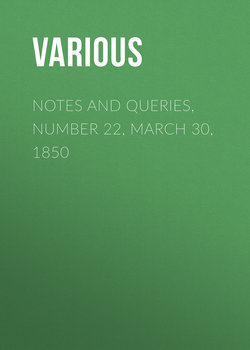Notes and Queries, Number 22, March 30, 1850

Реклама. ООО «ЛитРес», ИНН: 7719571260.
Отрывок из книги
In two former communications on a subject incidental to that to which I now beg leave to call your attention, I hinted at a result far more important than the discovery of the author of the Taming of a Shrew. That result I lay before your readers, in stating that I think I can show grounds for the assertion that the Taming of the Shrew, by Shakspeare, is the original play; and that the Taming of a Shrew, by Marlowe or what other writer soever, is a later work, and an imitation. I must first, however, state, that having seen Mr. Dyce's edition of Marlowe, I find that this writer's claim to the latter work had already been advanced by an American gentleman, in a work so obvious for reference as Knight's Library Edition of Shakspeare. I was pretty well acquainted with the contents of Mr. Knight's first edition; and knowing that the subsequent work of Mr. Collier contained nothing bearing upon the point, I did not think of referring to an edition published, as I understood, rather for the variation of form than on account of the accumulation of new matter. Mr. Dyce appears to consider the passages cited as instances of imitation, and not proofs of the identity of the writer. His opinion is certainly entitled to great respect: yet it may, nevertheless, be remarked, first that the instance given, supposing Marlowe not to be the author, would be cases of theft rather than imitation, and which, done on so large a scale, would scarcely be confined to the works of one writer; and, secondly, that in original passages there are instances of an independence and vigour of thought equal to the best things that Marlowe ever wrote—a circumstance not to be reconciled with the former supposition. The following passage exhibits a freedom of thought more characteristic of this writer's reputation than are most of his known works:—
A short account of the process by which I came to a conclusion which, if established, must overthrow so many ingenious theories, will not, I trust, be uninteresting to your readers. In the relationship between these two plays there always seemed to be something which needed explanation. It was the only instance among the works of Shakspeare in which a direct copy, even to matters of detail, appeared to have been made; and, in spite of all attempts to gloss over and palliate, it was impossible to deny that an unblushing act of mere piracy seemed to have been committed, of which I never could bring myself to believe that Shakspeare had been guilty. The readiness to impute this act to him was to me but an instance of the unworthy manner in which he had almost universally been treated; and, without at the time having any suspicion of what I now take to be the fact, I determined, if possible, to find it out. The first question I put to myself was, Had Shakspeare himself any concern in the older play? A second glance at the work sufficed for an answer in the negative. I next asked myself on what authority we called it an "older" play. The answer I found myself obliged to give was, greatly to my own surprise, On no authority whatever! But there was still a difficulty in conceiving how, with Shakspeare's work before him, so unscrupulous an imitator should have made so poor an imitation. I should not have felt this difficulty had I then recollected that the play in question was not published; but, as the case stood, I carefully examined the two plays together, especially those passages which were identical, or nearly so, in both, and noted, in these cases, the minutest variations. The result was, that I satisfied myself that the original conception was invariably to be found in Shakspeare's play. I have confirmed this result in a variety of ways, which your space will not allow me to enter upon; therefore, reserving such circumstances for the present as require to be enforced by argument, I will content myself with pointing out certain passages that bear out my view. I must first, however, remind your readers that while some plays, from their worthlessness, were never printed, some were withheld from the press on account of their very value; and of this latter class were the works of Shakspeare. The late publication of his works created the impression, not yet quite worn out, of his being a later writer than many of his contemporaries, solely because their printed works are dated earlier by twenty or thirty years. But for the obstinate effects of this impression, it is difficult to conceive how any one could miss the original invention of Shakspeare in the induction, and such scenes as that between Grumio and the tailor; the humour of which shines, even in the feeble reflection of the imitation, in striking contrast with those comic(?) scenes which are the undisputed invention of the author of the Taming of a Shrew.
.....
As the morning does not derive its glory from the circumstance of its being "wash'd with dew," and as it is not a peculiarly apposite comparison, I conclude that here, too, as in other instances, the sound alone has caught the ear of the imitator.
In Act V. Sc. 2., Katharine says,—
.....